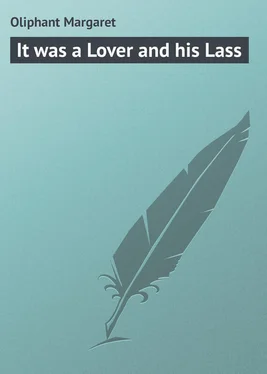Margaret Oliphant - It was a Lover and his Lass
Здесь есть возможность читать онлайн «Margaret Oliphant - It was a Lover and his Lass» — ознакомительный отрывок электронной книги совершенно бесплатно, а после прочтения отрывка купить полную версию. В некоторых случаях можно слушать аудио, скачать через торрент в формате fb2 и присутствует краткое содержание. ISBN: , Жанр: foreign_prose, на английском языке. Описание произведения, (предисловие) а так же отзывы посетителей доступны на портале библиотеки ЛибКат.
- Название:It was a Lover and his Lass
- Автор:
- Жанр:
- Год:неизвестен
- ISBN:http://www.gutenberg.org/ebooks/49597
- Рейтинг книги:3 / 5. Голосов: 1
-
Избранное:Добавить в избранное
- Отзывы:
-
Ваша оценка:
- 60
- 1
- 2
- 3
- 4
- 5
It was a Lover and his Lass: краткое содержание, описание и аннотация
Предлагаем к чтению аннотацию, описание, краткое содержание или предисловие (зависит от того, что написал сам автор книги «It was a Lover and his Lass»). Если вы не нашли необходимую информацию о книге — напишите в комментариях, мы постараемся отыскать её.
It was a Lover and his Lass — читать онлайн ознакомительный отрывок
Ниже представлен текст книги, разбитый по страницам. Система сохранения места последней прочитанной страницы, позволяет с удобством читать онлайн бесплатно книгу «It was a Lover and his Lass», без необходимости каждый раз заново искать на чём Вы остановились. Поставьте закладку, и сможете в любой момент перейти на страницу, на которой закончили чтение.
Интервал:
Закладка:
"Oh, mamma, if money was to come into the family! that is what Lilias says. If some uncle they never heard of was to come from India, or somebody they had been kind to die all at once, and leave them a fortune."
"I will not have you see so much of Lilias, if she fills your head full of nonsense," said Mrs. Seton. "Such folly! for they have no uncle in India, that ever I heard tell of; and people now-a-days don't make those daft-like wills – though, to be sure, Sir Patrick's an example. Did you ever see, Mr. Murray, the young man we've heard so much about?"
"The fellow that got the money," young Stormont said.
"What kind of a being was it?" said the minister. "Some supple foreign lad that flattered the silly old man. It has always been strange to me that there was nobody near to speak a word for justice and truth."
"You are hard upon foreigners," said Lewis. "It is not their fault that they are foreign. Indeed they would not be foreign there , you know, but the people of the country, and we the foreigners. I knew this fellow, as you say. He was not even foreign, he was English. The old gentleman was very fond of him, and good to him. He did not know anything about the money."
"Ah, Mr. Murray, you'll never persuade me that. Would a young man give up years of his life to an old one without any expectations? No, no, I cannot believe that."
"Did he give up years of his life? Oh, yes, I suppose so. No one thought of it – in that light. He loved him like his father. There was no one else to take care of him, to make him happy. I see now from the other point of view. But I do not think he meant any harm."
This Lewis said much too seriously and anxiously for his rôle of spectator, but at the moment, there being no suspicion, no one remarked his nervous earnestness. He cast a sort of appealing glance round the table, with a wistful smile.
"No one," he said, " there , thought any harm. He was the most astonished himself."
"And what kind of a fellow was he," said Stormont, "a gentleman, or just some cad the old man had picked up?"
At this Lewis grew red in spite of himself, then did his best to laugh, though the effort was great.
"I do not know," he said, "having always lived abroad, what is exactly a cad, and also what, when you come to its exact meaning, is a gentleman?"
"Oh, a gentleman – " said Mrs. Seton. "Bless me, what a question? It is just – not to be mistaken: there is no two words about it – No, no – describe it! how could I describe it? A gentleman! my dear Mr. Murray, you can be in no doubt about that."
"And a cad is just a cad," said young Stormont, "a fellow, don't you know, that's not a gentleman – just as a hill isn't a river, and can never be."
"As distinct as that?" said Lewis. "It is hard upon us who have always lived abroad. It means, to be well-educated and well-bred – "
"And well-born, Mr. Murray; you must not leave out that. Well-born, above all things; there's everything in race."
"But those whom you meet only in society," said Lewis, "even on the Continent – where every man must have ses papiers – he does not carry them about with him. He does not pin a little carnet on his sleeve. You must take him on trust."
"That is just the danger of promiscuous society," said Mrs. Seton, briskly. "That is what I always say to papa. It is so easy to be taken in by a fair exterior; and when you don't know who people are, and all about them, it's a serious thing," said the lady, shaking her head, "especially where there are young people. Oh, it is a very serious thing, Mr. Murray. I am sure I always say about ball-room acquaintances and persons of that sort, if harm comes of it, really you have nobody to blame but yourself."
There was a pause after this, and a great sense of embarrassment. Katie looked at her mother with anxious, telegraphic communications, of which Mrs. Seton either would not or did not take any notice. Even Mr. Stormont, though not very quick, saw the dilemma. Lewis was the most self-possessed.
"I must be more grateful than ever," he said, turning to his hostess, with that conciliatory smile which was so natural to him, "that you have given your hospitality so kindly to one who has no vouchers, no one to speak for him – a stranger."
"Bless me, Mr. Murray, I hope you never thought – Dear, dear, you might be sure that was the last thing in my mind. Present company, you know, of course; and then in some cases the first look is enough," said Mrs. Seton, with a gracious bow to her guest.
This little episode distracted the company altogether from the question propounded by Stormont about Sir Patrick Murray's heir, and during the rest of the meal Lewis exerted himself to keep away from dangerous subjects: which was a greater mental effort to him, perhaps, than any he had ever made in his life. For he was ready by nature to take everybody he met into his confidence. He had the most unbounded trust in his fellow-creatures, and he wanted to be approved, to have the sympathy of those about him. He, whose impulse it was to be always looking out of the window – how could he put up shutters, and retire into seclusion and mystery? It was the thing of all others most difficult to him. But he was quick and ready, and kept his wits about him, having been thus put on his guard. He betrayed something else with great and simple pleasure – his own accomplishments, which were, in Mrs. Seton's opinion, many. He showed them his amateur sketch-book, which seemed the work of a great artist to these uninstructed people, and, indeed, was full of fairly brilliant dashes at scenery and catchings up of effect, which he himself was well aware were naught, but which were very attractive to the uncritical. And it was all they could do to keep him from the piano, where he sadly wanted to let them hear one or two morceaux from the last opera. Mrs. Seton had to place herself in front of the instrument with an anxiety to prevent the desecration of the Sabbath without exposing herself to the charge of narrow-mindedness, which was highly comic.
"That will be for to-morrow," she said. "We must not have all our good things at once. No, no, we must leave something for to-morrow. The servants, you see, have prejudices – we have to consider so many things in a manse. A clergyman's family are always talked about: and then economy's my principle, Mr. Murray; we must keep something for to-morrow. And that just reminds me that I hope you will come in a friendly way and spend the evening – we have no parties, you know, here – but if you will just come in a friendly way: and then it will give us the greatest pleasure," Mrs. Seton said, nodding her head and smiling.
Thus immediate advantage sprang from the over-boldness of his foreign ways; and when he left the manse, young Stormont, though somewhat contemptuous of a man who "went in for" music and spoke all sorts of languages, yielded to the ingratiating ways of the stranger, and invited him half surlily to lunch with him next day at the tower, which Lewis accepted with his usual cordiality.
He went back with a sense of exhilaration to the parlour overlooking the village street, all so still in the drowsy Sunday afternoon.
"Me voici lancé," he said to himself, with glee. He had known the excitements of society very different from that of Murkley, but he knew the true philosophy of being not only contented, but pleased, when you cannot get everything you like, with what you are lucky enough to be able to get.
CHAPTER V
"We must ask just whoever there is to ask," said Mrs. Seton. "You see, there will be no difficulty in entertaining them, with that young man. He will play his music as long as anybody will listen to him, or I'm mistaken. Philip Stormont is coming; I had to ask him, as he was there; and you can send Johnnie over with a note to the Borrodailes, Katie, and I'll write up to the Castle myself. Then there's young Mr. Dunlop, the assistant at Braehead. He is of a better class than most of the young men: and the factor – but there's three girls there, which is a terrible band of women. If you were very good, and all things went well, and there were two or three couples, without disturbing other folk, and papa had no objection – "
Читать дальшеИнтервал:
Закладка:
Похожие книги на «It was a Lover and his Lass»
Представляем Вашему вниманию похожие книги на «It was a Lover and his Lass» списком для выбора. Мы отобрали схожую по названию и смыслу литературу в надежде предоставить читателям больше вариантов отыскать новые, интересные, ещё непрочитанные произведения.
Обсуждение, отзывы о книге «It was a Lover and his Lass» и просто собственные мнения читателей. Оставьте ваши комментарии, напишите, что Вы думаете о произведении, его смысле или главных героях. Укажите что конкретно понравилось, а что нет, и почему Вы так считаете.












